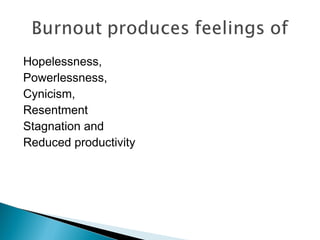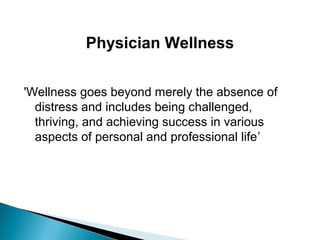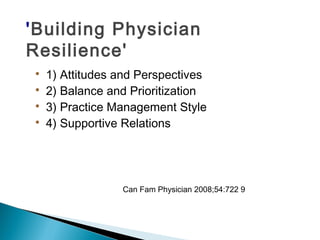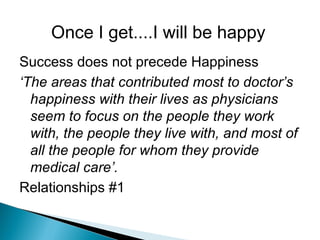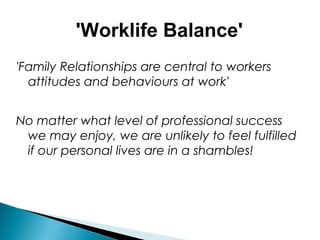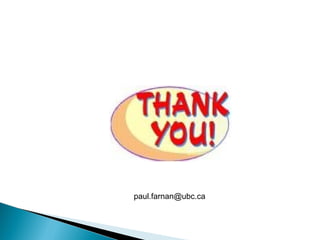Session 9 farnan the patient with complex chronic pain
- 1. The Foundation for Medical Excellence Vancouver March 8 2014 Dr. Paul A. Farnan farnan@mail.ubc.ca
- 2. Physicians – Qualities and Vulnerabilities The House of Medicine Acute V Chronic Illnesses Pain Patients at Risk? Clinicians at Risk? Stress, Burnout, Mental Health Staying well
- 3. Qualities & Vulnerabilities Compulsiveness Need to Control Perfectionism Imposter Syndrome
- 4. • Competitive, Controlling, Perfectionistic • We ultimately start to assimilate the values, attitudes of the profession • OverWork is the norm • Blurred boundaries • Neglect health and relationships • ‘Psychology of Postponement’
- 5. Work in the House of Medicine Judging ourselves by what we do rather than by who we are Work is placed in an exhalted position because it is important to be successful or to be seen to be successful by our peers Work can become a state of mind rather than a job Work starts to control our lives
- 6. Postpone Gratification Attention to the needs of marriage is regularly postponed Assume that delay will not jeopardize quality of relationship Preference for work Psychology of avoidance To escape emotional intimacy Gabbard & Menninger 1989
- 7. We admit the Respectable but conceal the Darker side • Passion for work • Non-stop schedules • Obsession for work • Shows us in a good light and glorifies ‘workaholism’ • Also perpetuates the myth that it brings only positive outcomes • Anxiety • Depression • Chronic Fatigue • Family Tensions • Relationship Strains • Life has become unmanageable • Loss of Control • ‘No Time’
- 8. Loeser Patient with Chronic Pain PAIN BEHAVIOUR a PP ‘Injury’ PAIN SUFFERING
- 10. Patient with CCP Complex Unhappy Have not responded or are made worse by pharmacotherapy Attempted rescue by MD makes it worse Solutions are largely non-medical
- 11. Dysfunctional/alcoholic family of origin Emotionally traumatized Past episode of SUD Stimulus augmenters - deficit in hedonic tone Lack effective coping skills Dependent traits Problems with relationships Savage 1991
- 13. Stress is the automatic non-specific response of the human organism to any change or demand. Stress is a particular relationship between the person and the environment that is appraised by the person as taxing or exceeding his or her resources and endangering his or her well-being. The response is mediated by the autonomic nervous system.
- 14. Acute & Chronic Stress Acute Stress: the threat is immediate and the need to respond is instantaneous.. Adrenaline and noradrenaline of the adrenal gland Chronic Stress: the threat is prolonged and unabated, and it usually involves the presence in the blood of cortisol.
- 15. Freudenberger – occupational exhaustion in those in the helping professions (1980) “a state of fatigue or frustration brought about by devotion to a cause, way of life, or relationship that failed to produce the expected reward” Not just physical tiredness – it is an erosion of the soul in people with ideals and commitment
- 16. 1. Emotional Exhaustion – feeling emotionally overrun/exhausted by one’s work – little left to give 1. Reduced Personal Accomplishment – perception of clinical ineffectiveness, dissatisfaction with achievement 1. Depersonalization – Becoming distant and cynical, view others as objects, avoidance of people. Negative attitude towards others and self Maslach
- 18. Read the twenty-five statements below and grade how much each one pertains to you, using the following scale: 1 = never true; 2 = sometimes true; 3 = often true; and 4 = always true. When you are finished, add the numbers in the blanks for your total score. Chained to the desk – A Guidebook for Workaholics Bryan E. Robinson, Ph.D.
- 19. 19 Physician at Risk Undervalued Under-supported Burnt out Life Crises Transitions Illness of the provider
- 20. 20 Physician at Risk Strong relationship with patient Unresolved rescue fantasies The ‘special patient’ Inability to set limits Overconfidence Denial about possibility of boundary issues
- 21. Medical profession does not encourage physicians to admit health vulnerabilities or seek help - Levine & Bryant, 2000 ‘Illness doesn’t belong to us. It belongs to them, the patients. Doctors need to be taught to be ill. We need permission to be ill and to acknowledge that we are not superhuman’ McKevitt C, Morgan M. Illness doesn’t belong to us J R Soc Med 1997;90: 491 -495
- 22. Suboptimal attention to self- wellness by MDs '..ignorance, indifference and carelessness of physicians towards their own health' Physicians neglect to have physical examinations and procrastinate when seeking medical treatment
- 23. Physician Wellness 'Wellness goes beyond merely the absence of distress and includes being challenged, thriving, and achieving success in various aspects of personal and professional life’
- 24. 'Building Physician Resilience' 1) Attitudes and Perspectives 2) Balance and Prioritization 3) Practice Management Style 4) Supportive Relations Can Fam Physician 2008;54:722 9
- 25. Physicians – Qualities and Vulnerabilities The House of Medicine Acute V Chronic Illness Pain Patients at Risk? Physicians at Risk? Stress, Burnout, Mental Health Staying well “The fool, with all his other thoughts, has this also: he is always getting ready to live.” - Epicurus, 341-270 BC
- 26. Once I get....I will be happy Success does not precede Happiness ‘The areas that contributed most to doctor’s happiness with their lives as physicians seem to focus on the people they work with, the people they live with, and most of all the people for whom they provide medical care’. Relationships #1
- 27. Happiness • ‘Interpersonal relationships are the number one predictor of well-being’ Tal Ben-Shahar
- 28. Physicians and Intimate Relationships • “In many physicians, the character armour that enables them to do their daily work becomes hypertrophied and is carried from the workplace into the home” • “Hence, giving and receiving love in the medical ‘marriage’ becomes a challenge”
- 29. Family Psychological effects of work & family shows that the psychological health of the family has important implications for the morale, stability and productivity of the workplace
- 30. 'Worklife Balance' 'Family Relationships are central to workers attitudes and behaviours at work' No matter what level of professional success we may enjoy, we are unlikely to feel fulfilled if our personal lives are in a shambles!
- 31. Burnout - 6 Category Framework Workload(Too much work. Not enough resources) Control(Micromanagement, Lack of influence, Accountability without power) Reward(not enough acknowledgement or satisfaction) Community(Isolation, Conflict, Disrespect) Fairness( Discrimination, Favouritism) Values(Ethical Conflicts, Meaningless Tasks) Maslach & Leiter
- 32. Principles of Faculty Satisfaction and Work-Life Balance Meaningful Work Challenges commensurate with Skills, Interests, and Resources Opportunities for Professional Development A Culture that cultivates Professionalism and Professional Satisfaction Autonomy and Flexible Scheduling A Culture that Values and Encourages Life outside of Work A Culture of Wellness Shanafelt, Dec 2008 Mayo Clinic
Editor's Notes
- Medical School/Residency/Practice etc Our apprenticeship model Learn not only skills but Behaviours Dedication to work viewed as positive trait Emphasizes material gain through hard work Glorify professionals who put aside family duties to work long hours Encourages unbalanced & out of control work Unable to slow down or to nurture ourselves (and loved ones) Emphasis on material gain through hard work Revere professionals who put aside family duties Encourages unbalanced & out of control work Assumptions that we are immune to emotional or physical ill-health Unable to slow down or to nurture ourselves Difficulty asking for help
- Pain has an effect on physical and emotional behaviour Pain Behaviour is an interesting social communication
- This is to point out a few keys to stress management. Acute stress is catecholamine driven Each catecholamine burst effects the body for up to 60 minutes Chronic stresses are re-occurring smaller events which cause release of catecholamines and cortisol Physicians tend to enjoy the ‘rush’ of acute events, but don’t handle chronic events well at all
- The pay-off for self-sacrifice never materializes Feelings of betrayal and disillusionment with medicine
- Illness is a process, not an event
















